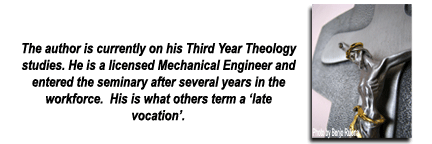Paradoxes Of The Cross

The Cross-event is the selfrevelation of God in the form of a three-fold love. As Catholics we believe that on the Cross we can find the love of God the Father for Jesus Christ, the love of the Son for His Father and the love that is given and received for humanity, the Holy Spirit. It is from the Cross that we come to know the will of the Father for His Son, the acceptance of the Son of the Father’s will and the overflowing love of the Father and the Son who both suffer for the sake of humanity.
The breakdown in the Cross is the context of the breakthrough for the Resurrection. I can say that the identity of the Risen Christ is destroyed when we forget the Cross where Christ was crucified for all. Sad to say, some faithful are so engrossed in the Resurrection that the death of Christ, which should be given emphasis as well, has been ignored. Only by attending to the Cross in the light of the Resurrection, and to the Resurrection in the shadow of the Cross can we begin to grasp deeply and fully the meaning of the inseparable saving Death and Resurrection of Jesus Christ.
At first glance, the self-revelation of God on the Cross appears to be a cobweb of confusion. It is such because it is basically paradoxical in character. Why? I have come across His presence in silence, His power in weakness and His light in darkness. But after asking for and receiving divine guidance, I have realized that it is through these paradoxes that the message shines all the more brightly.
It is in the seeming silence of God on the Cross that His love for His Son is fully and immutably expressed, like a good parent who knows the possibility of falling and being hurt yet one day allows his kid to take his first steps alone; because the child will only learn to walk by walking by himself. While Christ was hanging on the cross His Father was definitely there looking at Him with love, silently but truly, warmly embracing Him and allowing Him to yield His spirit. This is enabling love – the love that does not spoil, the love that does what is needed to be done for the good of the beloved, the love of God for us, the love that we need as persons with intelligence and freedom.
Likewise, it is from the seeming weakness that the real strength comes. A good father simulates a serious struggle with his son and allows himself to be defeated. He does this not only to humor the child but to encourage the latter to be strong and to do his best in everything he undertakes. What happened on the Cross was for real, it was no simulation at all. The Father did truly allow himself to become weak, as it were defeated, when His only begotten Son really died on the Cross to establish the new and much stronger, in fact, everlasting covenant with us. The weakness of God on the Cross overcame once and for all the power of evil, sin and death.
 It is in the darkness, on the other hand, that we can see the light. This is what happened on the Cross. Christ needed to pass through the darkness of death in order to give light of life to humanity. His death is saving and leads to resurrection because he clearly embraced it with love for the Father and for us. This is our call as well.
It is in the darkness, on the other hand, that we can see the light. This is what happened on the Cross. Christ needed to pass through the darkness of death in order to give light of life to humanity. His death is saving and leads to resurrection because he clearly embraced it with love for the Father and for us. This is our call as well.
The experience of the Cross in one form or another is a universal human experience with which everyone can identify. The Cross is a sign of love. Being a lover of Christ is not that easy. It entails sacrifice, a sacrificial love. Certainly, life here on earth is a mixture of joys and pains; yet sometimes it is the pain that is dominantly encountered in life. But behind the tears, while coping with the afflictions, there is God who loves us and reveals Himself in the same manner as when He did on the Cross through His only begotten Son. It is from great struggles of love that great learning comes and the newness of life is attained. In the process of dying we learn to let go, and in rising we pass over to the new life – the life with, for and of God in us.
You may write the author at: LMI San Carlos Pastoral Complex, Edsa, Guadalupe, Makati City